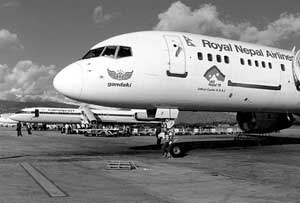 This week the Finance Minister made very interesting announcements on privatisation. He and other colleagues from the government have been harping on this for ages but nothing much has been done. Curiously enough, this time around he seems serious. Whether intentionally or through happenstance, he flew Indian Airlines from Delhi to Kathmandu. A move like that might just indicate the urgency of the need to privatise Royal Nepal Airlines.
This week the Finance Minister made very interesting announcements on privatisation. He and other colleagues from the government have been harping on this for ages but nothing much has been done. Curiously enough, this time around he seems serious. Whether intentionally or through happenstance, he flew Indian Airlines from Delhi to Kathmandu. A move like that might just indicate the urgency of the need to privatise Royal Nepal Airlines. India, for its part, has been positively dizzy with action on privatisation, or at the very least, shaping up their sick public enterprises. Indian Airlines, for instance, bears examination as a rather interesting government undertaking. In the last couple of months, it has certainly pulled up its socks, so to speak-flights have been on time and luggage arrives at the baggage claim just as one walks into the arrival lounge, omitting the need for tedious and frustrating waits. Shockingly for a state-owned and run enterprise, they even seem to be developing a sense of customer service. At the check-in counter for flights to Kathmandu flights, at least, travellers are asked whether they want a window seat to view the mountains. If they keep this sort of thing up, well, they might just give the more glamorous private airlines a run for their retractable wings. The private carriers have decided retaliatory action is called for and they've unleashed a media blitz advertising better rates and countering sops to flyers.
Royal Nepal one time foolishly thought it was better off than Indian Airlines, mainly because it was not as bankrupt as the Indian carrier. Vain optimism perhaps, but even by his benchmark Royal Nepal is in a pretty pathetic state-how could they possibly be left with one-and-a-half aircraft to fly to half-a-dozen destinations? Internal squabbles and political interference are still a problem with IA, but its management has undergone a significant change in its thinking and delivery. It is starting to understand that in a market that is affected by so many factors, they have to develop a core advantage to remain competitive. Once such will is there, political will and support from the concerned ministries and departments becomes less of an issue. Privatisation requires strong political will, although a word of caution is not out of place here-there are numerous examples the world over to show that simply shifting ownership from the government to the private sector does not immediately bring about the desired improvements in the enterprise, whether operationally or financially. The privatisation process has to begin with making the enterprise attractive to people who may be interested. This is the nub of the matter-you do not start thinking about privatisation from the perspective of ridding the government of a loss-making undertaking, or keeping a firm grip on one that is doing well. You start by asking what sort of people in the private sector might be interested in taking on one government-owned enterprise or another. The lack of this kind of sharp thinking is why your faithful Beed is asked with such annoying regularity-perhaps it coincides with the spring and neap tides, or perhaps it simply matches the frequency with which I push privatisation in this space-why on earth would someone want to acquire a loss-making enterprise, even with support and subsidies from government.
A situation like this needs some strong medicine. We might start with transferring control of all public enterprises from their respective ministries or departments to the privatisation cell. After that point, the decision would rest with the privatisation cell, which would draw on the expertise of professionals in such matters, to decide on which enterprises can continue, which ones should go out on management contracts, which could be sold and which, alas, deserve no kinder fate than liquidation.
Unfortunately, the credibility of the privatisation process in this country is at an unfortunate ebb, given the strange goings-on at the Butwal Power Company, which still resides in the government's house, despite so many years of attempts to marry it off. We need to know what the intention is here, or "privatisation" will simply become a shibboleth used in infinite present continuous. Hope the Finance Minister's Indian Airlines flight indicates that he means business.
Readers can post their views at [email protected]



